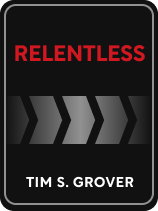

This article is an excerpt from the Shortform book guide to "Relentless" by Tim Grover. Shortform has the world's best summaries and analyses of books you should be reading.
Like this article? Sign up for a free trial here .
Is there still more you can do to become a better person? Do you want to learn how to keep improving yourself?
In Relentless, Tim Grover highlights the importance of self-improvement as a stepping stone to achieving your goals. He provides three methods to constantly push yourself to improve: don’t define what’s impossible, never settle for “good enough,” and surround yourself with relentlessness.
Below we’ll go into more detail on these three methods and how they can benefit you in the present and future.
Never Stop Improving to Prosper
Grover says that knowing how to keep improving yourself is a crucial part of doing everything you can to achieve your goals, and therefore is crucial for acting relentlessly. In addition, by constantly pushing as hard as you can to improve, you’ll better understand what you’re capable of and how you can use those capabilities to succeed.
(Shortform note: Psychology suggests that constantly pushing yourself hard, as Grover encourages, can lead to burnout—a kind of emotional exhaustion characterized by disinterest and cynicism in regards to your field. The risk of burnout suggests that there are moments when not pushing yourself will actually better enable you to succeed in the long run, since it’ll make you healthier and keep you motivated to succeed. To avoid burnout while still pushing hard, experts recommend you learn to recognize when you’re pushing yourself out of habit versus when you’re doing it for a worthy goal. Ease off if you’re acting habitually, and keep going if you have a good reason to do so.)
Grover recommends three methods that will help you commit to constant improvement:
- Don’t define what’s impossible
- Never settle for “good enough”
- Surround yourself with relentlessness
Method #1: Don’t Define What’s Impossible
Grover emphasizes that an important part of seeking constant improvement is never claiming that something is impossible because it places a limit on you that may or may not actually exist. After all, there are plenty of things that seemed impossible until somebody did them—going to the moon, for example, or running the 100-meter dash in under 10 seconds. By calling things impossible, you naturally start focusing on what you think you can’t do, which is the kind of thinking that leads to fears and self-doubts that hold back people who are just “good” or “great.”
Redefine Failure
To avoid thinking about what you can’t do, Grover also recommends you redefine failure. It’s not a lack of success—the only failure is giving up and no longer working towards success. By using this definition of failure, you won’t focus on what you can’t do and will instead focus on how you can improve and overcome setbacks.
(Shortform note: You might think that not acknowledging the impossible or failure like Grover recommends means not being in touch with reality, and exaggerating your own abilities. Carol S. Dweck (Mindset) argues that this is not the case and that those who believe they can improve to overcome challenges actually have a better understanding of their abilities. This is because focusing on improvement requires knowing your shortcomings and testing your limits. On the other hand, giving up or declaring you can’t do something means not discovering your full capabilities.)
Method #2: Never Settle for “Good Enough”
Even though it isn’t explicitly giving up, putting in only partial effort or settling for “good enough” means no longer having a relentless mindset: As soon as you settle, you stop putting in everything you have.
Grover also points out that each time you settle for doing less, you’re only making it easier for yourself to settle again in the future. This means that not only do you fail to act relentlessly at the moment, but you also have a high risk of not acting relentlessly later on. To avoid this, Grover recommends you seek out new responsibilities and ways to improve without anyone asking you to.
(Shortform note: While Grover suggests you never accept where you are in your process of improvement, Mark Manson (The Subtle Art of Not Giving a F*ck) argues that doing so is crucial for good emotional health. Manson explains that when you always expect yourself to be exceptional, you set yourself up for stress and disappointment when you inevitably don’t meet your high expectations. By lowering your expectations, you won’t judge yourself by too harsh a standard. This helps you better appreciate your own abilities and feel less inadequate and insecure. However, keep in mind that while lowering expectations might be preferable for mental health, doing so will also prevent relentlessness.)
Method #3: Surround Yourself With Relentlessness
Grover’s third method to keep improving yourself recommends you surround yourself with other relentless people. Relentless people know what’s needed to succeed, and will keep you accountable to those standards and be totally honest about areas for improvement. Non-relentless people can’t offer this level of accountability and honesty, because they’ll be uncomfortable pushing you harder or worried about offending you.

———End of Preview———
Like what you just read? Read the rest of the world's best book summary and analysis of Tim Grover's "Relentless" at Shortform .
Here's what you'll find in our full Relentless summary :
- The qualities you’ll need to become the best in your field
- Why sacrifices and discomfort are necessary for growth
- Why you should practice indulging in your primal self






